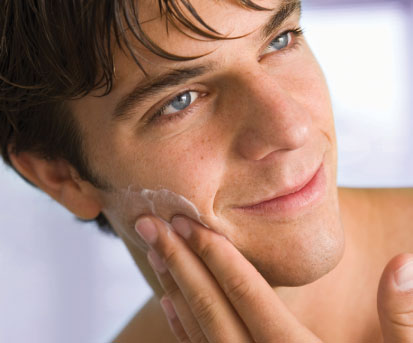Attitudes Evolve as Men's Grooming Market Explodes!
by Michael Bruggeman
The days of targeting marginalized stereotypes is over as marketers of men's grooming items ignite a race to capture the attention of 130 million product-curious men.
In 1994, the word “Metrosexual,” catches on as a term describing the all-new, progressive, fashion-conscious metropolitan heterosexual. A word so powerful, it shaped consumerism for over a decade, and blurred lines between what was thought to be “manly” versus “gay.”
In 2007, Euromonitor International predicts the emergence of the “Übersesxual,” projecting an 18 percent global growth potential, roughly $26 billion in sales by 2011. That premonition proved to be true when the May 19, 2009 edition of the Sun Sentinel hit the streets, splashing the headline: “Men’s Skincare Goes Übersexual and Guy-liner goes mainstream.” Author Rod Hagwood described this newest male archetype as more confident, stylish, competitive, and yes, decidedly more masculine than his predecessor.
Über is ünter (under) in short notice as 2010 ushers in the newest generation of buying-age men, the “Retrosexual.” Retrosexuals hearken values from the days of Hollywood’s late 1940s male legends. It is a typical night at the Caliente Tropics Resort in Palm Springs. The Rat Pack is lighting up the town. This group of suave, courageous, debonair men never shied away from looking good. When it comes to grooming, however, these guys prefer good old fashioned barber shops. Retrosexuals too prefer dedicated shops and environments where products and services are discreetly male. Spa directors and retail merchandisers understanding these drivers of the new retro generation stand to ride the men’s grooming wave, and reap the benefits of this burgeoning new business opportunity. L’Oreal’s UK Men’s Grooming Report, 2010, states that 72 percent of the overall men surveyed, and 84 percent of 18 to 29 year-olds, felt that being well-groomed made them feel more confident. The report went on to say that men were feeling, “worn down by the recession,” and actively sought ways to look less tired.

Feeling the impacts of the recession is not a UK exclusive phenomenon. Workaholic “Baby Boomers” represent 72.8 million of the world’s most ardent consumers. These men and women are shoppers of the highest order. Boomers have been watching and learning. According to Robert Cribb of the Toronto Star, worldwide sales of male-targeted skin care, hair care, bath and shower products hovered around $20 billion last year, up more than 40 percent over a five year period. Men are discovering there is no stigma to healthy, younger looking skin, fueling the trend of new male grooming product
introductions, worldwide.
To date, the solution has been to cautiously add a few skin care products to an existing shaving line, or repackage a few women’s line SKUs in bold masculine colors to test the waters in this vast new territory. The short-term success is undeniable. Yet, as male consumers continue to learn and understand the skins in which they live, the differences between male and female skin, and skin type, will become increasingly apparent.